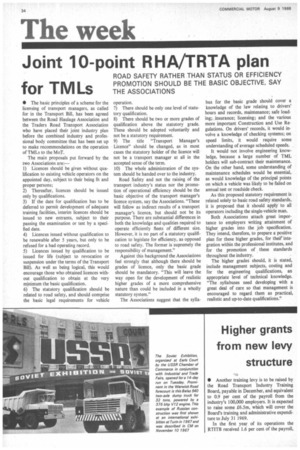Joint 10-point RHA/TRTA plan for TMLs
Page 36

If you've noticed an error in this article please click here to report it so we can fix it.
• The basic principles of a scheme for the licensing of transport managers, as called for in the Transport Bill, has been agreed between the Road Haulage Association and the Traders Road Transport Association who have placed their joint industry plan before the combined industry and professional body committee that has been set up to make recommendations on the operation of TMLs to the MoT.
The main proposals put forward by the two Associations are:—
I) Licences should be given without qualification to existing vehicle operators on the appointed day, subject to their being fit and proper persons; 2) Thereafter, licences should be issued only by qualifications.
3) If the date for qualification has to be deferred to permit development of adequate training facilities, interim licences should be issued to new entrants, subject to their passing the examination or test by a specified date.
4) Licences issued without qualification to be renewable after 5 years, but only to be refused for a bad operating record.
5) Licences issued by qualification to be issued for life (subject to revocation or suspension under the terms of the Transport Bill). As well as being logical, this would encourage those who obtained licences without qualification to obtain at the very minimum the basic qualification.
6) The statutory qualification should be related to road safety, and should comprise the basic legal requirements for vehicle operation.
7) There should be only one level of statutory qualification.
8) There should be two or more grades of qualification above the statutory grade. These should be adopted voluntarily and not be a statutory requirement.
9) The title "Transport Manager's Licence" should be changed, as in most cases the statutory holder of the licence will not be a transport manager at all in the accepted sense of the term.
10) The whole administration of the system should be handed over to the industry.
Road Safety and not the raising of the transport industry's status nor the promotion of operational efficiency should be the basic objective of the transport manager's licence system, say the Associations. "These will follow as indirect results of a transport manager's licence, but should not be its purpose. There are substantial differences in both the knowledge and qualities required to operate efficiently fleets of different size. However, it is no part of' a statutory qualification to legislate for efficiency, as opposed to road safety. The former is supremely the responsibility of management."
Against this background the Associations feel strongly that although there should be grades of licence, only the basic grade should be mandatory. "This will leave the way open for the development of realistic higher grades of a more comprehensive nature than could be included in a wholly statutory system."
The Associations suggest that the sylla
bus for the basic grade should cover a knowledge of the law relating to drivers' hours and records, maintenance; safe loading; insurance; licensing; and the various more important Construction and Use Regulations. On drivers' records, it would involve a knowledge of checking systems; on speed limits, it would require some understanding of average scheduled speeds.
It would not involve engineering knowledge, because a large number of TML holders will sub-contract their maintenance. On the other hand, some understanding of maintenance schedules would be essential, as would knowledge of the principal points on which a vehicle was likely to be failed on annual test or roadside check.
As this proposed statutory requirement is related solely to basic road safety standards, it is proposed that it should apply to all operators including the single-vehicle man.
Both Associations attach great importance to employers writing attainment of higher grades into the job specification. They intend, therefore, to prepare a positive plan for these higher grades, for theiP integration within the professional institutes, and for the promotion of these standards throughout the industry.
The higher grades should, it is stated, include management subjects, costing and for the engineering qualifications, an appropriate level of technical knowledge. "The syllabuses need developing with a great deal of care so that management is encouraged to regard them as practical, realistic and up-to-date qualifications."
















































































































































